STEEMIT 2017 Round UP – Analyzing the ‘Introduceyourself’ Category
There are many categories available on Steemit under which you can publish a post. Consistently in the top 10 categories is Introduceyourself. Being such a popular category to post in, I felt it was important to document the data for this category in 2017.
Categories are set by the 'Tags' you select when publishing a post. The first 'Tag' that you select is the Category the post will be recorded in. Once a post has been published on the Steemit platform, tags can be changed but the category will no change.
The aim of this analysis is to
Get an overview and document of the posts made to Introduceyourself in 2017
Look at the growth of this category over 2017
Look at the earnings of this category during 2017
Look at top authors of this category
Establish if the peaks found in previous tags remain in place for ‘Travel’
The data and the query
I have connected to the Steemsql paid subscription database held and managed by @arcange, using Microsofts Power BI
The SQL query used for this exploration is
Select *
FROM comments (NOLOCK)
where
( created >= CONVERT(datetime,'01/01/2017')
AND created< CONVERT(datetime,'01/01/2018')) and
Depth = 0
And category in ('travel')
This query will pull all of the Posts made during 2017 in the category Photography. It will ignore any comments and will also ignore tags. Just to point out, the first tag that is selected on a post is the category in which a post is recorded.
( I also received a few suggestions from @arcange to improve this query, however I already have pulled the data sets for these queries hence no change in the actual sql query based on the improved suggestions)
After this I carried out further transformations on the data using M. First with this piece of code I removed any columns I did not want
= Table.SelectColumns(Source,{"author", "title", "body", "created", "children", "total_payout_value",
"net_votes", "pending_payout_value", "total_pending_payout_value"})
Then with this piece of code I changed the data type on the date field
= Table.TransformColumnTypes(#"Removed Other Columns",{{"created", type date}})
After this I loaded the data into the model and proceeded to model the data using DAX calculations.
The Analysis
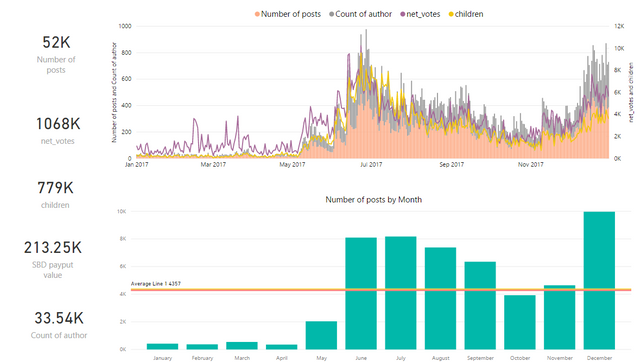
In 2017 52k posts were created in the Introduceyourself category by 33.54K authors. These posts netted 1068K votes and 779k comments and also generated a total SBD pay-out value of 231.25 SBD.
The average number of monthly posts to Introduceyourself is 4,357 and the median is 4,278. From May to July there was an increase in the number of posts per month. This then declined from August till October with an increasing in Nov and Dec.
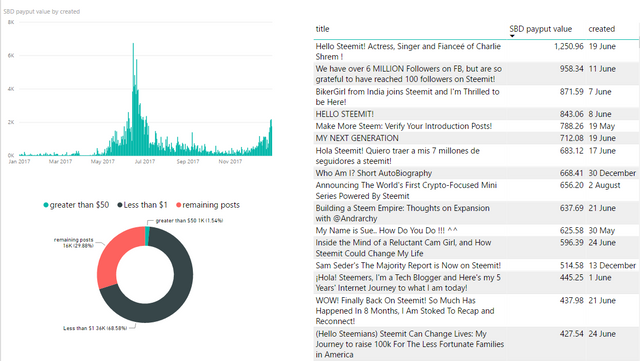
The visualisation above look at the SBD pay-outs. The bar chart shows the pay-outs over time. This is very much in line with other categories. We can also see that 30% of posts earn between $1 and $50. And less than 1.55% of posts earned over $50. The balance of posts earned less than $1. The table on the right shows the top preforming posts in Introduceyourself for 2017.
Let’s take a look at some averages
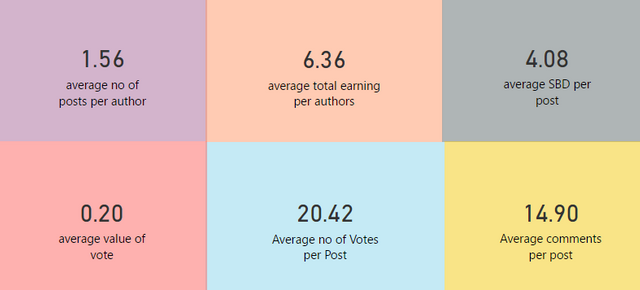
33.54K authors produced on average 1.56 posts each to the Introduceyourself category. The total of these 1.56 posts earned SBD 6.36 with the average post earning 4.08SBD. On average each post received 14.9 comments and 20.42 votes. The average vote value on posts in the Introduceyourself category was 0.20 SBD
For comparison the averages on the STEEMIT category are shown below
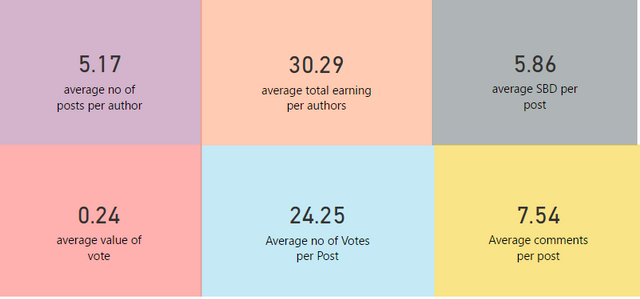
We can also view these averages over the year of 2017, we can see some peaks in payments from May to June with a decline till December where we can see another rise. What is interesting here is the number of comments per post, although this decreases after June, so far the Introduction tag is the only tag where the aver number of comments per post is higher than the average SBD per post.
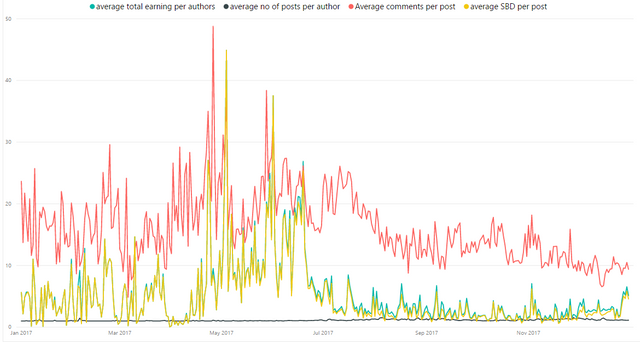
If we view the same information over months instead of days and including the average number of votes per post
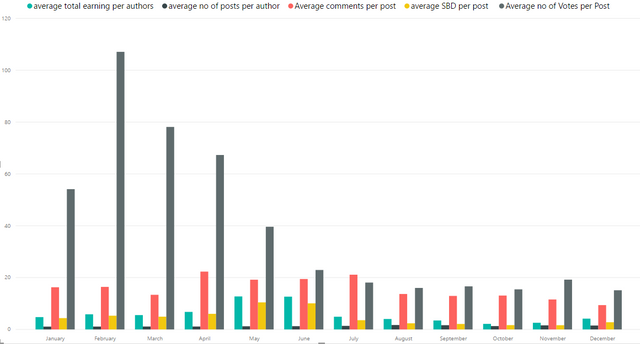
We can see clearer now that the average SBD per post peaked in May and June, and then decreased again until another slight rise in December. It is also clear to see that the average number of comments left on a post also peaked in April to July and decreased from then.
Previous analysis have shown that this peak in earnings in May and June related to the increase in the price of STEEM during these months. After this hard fork 19 happened in June, and this changed how rewards and voting power were calculated, and also introduced linear rewards. Prior to HF19 whales had exponentially more voting power than minnows. These changes also had the impact of reducing the number of votes as voting power changes were implemented.
Having a look at the authors that posted to the Introduceyourself category, first I have sorted the data by the average number of comments per post
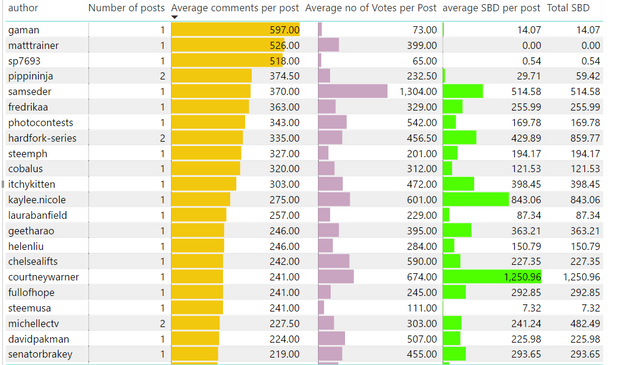
I then sorted the data by the average number of votes per post
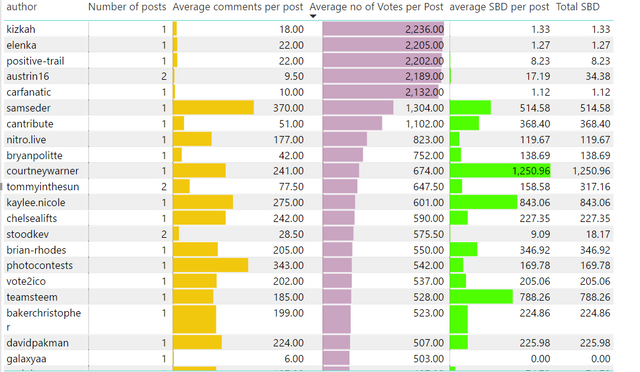
And finally I have sorted the data by the total SBD pay out value on posts to introduceyourself by author
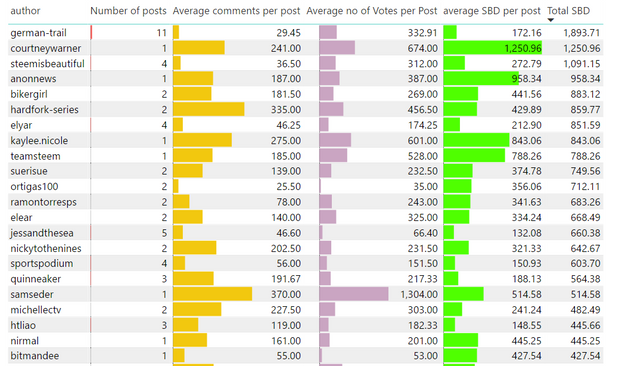
The following cluster chart shows the Number of comments against the Post SBD pay out.
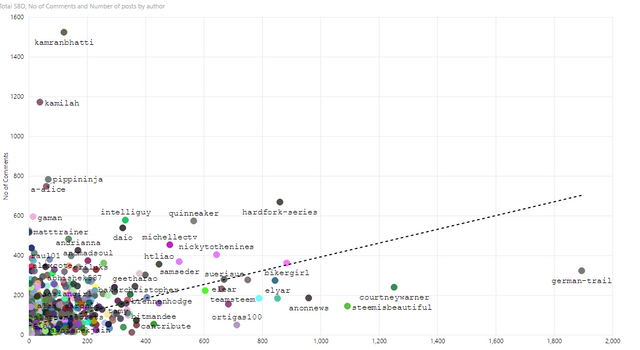
Conclusion
We can see clearly that posts on average in the Introduceyourself category tends to perform as well in terms of votes, payouts and comments. However the overall trends remain the same.
On saying that, this analysis does not take into consideration the quality of the post, however I do class comments as a good indicator of engagement. I am hopeful that the more quality the post, the more comments.
Personally I think this caregory will be more active in 2018 as more people come to Steemit
If you enjoyed this analysis, I have carried out further 2017 Category posts.
You can find a full analysis of the TRAVEL category here
https://utopian.io/utopian-io/@paulag/steemit-2017-round-up-analyzing-the-travel-category
You can find a full analysis of the PHOTOGRAPHY category here
https://utopian.io/utopian-io/@paulag/steemit-2017-round-up-analyzing-the-photography-category
You can find a full analysis of the STEEMIT category here
https://utopian.io/utopian-io/@paulag/steemit-2017-round-up-analyzing-the-steemit-category
You can find a full analysis of the LIFE category here
https://utopian.io/utopian-io/@paulag/steemit-2017-round-up-analysing-the-life-category
You can find a full analysis of the BLOG category here
https://utopian.io/utopian-io/@paulag/steemit-2017-round-up-analyzing-the-blog-category
You can find a full analysis of the cryptocurrency category here
https://steemit.com/utopian-io/@paulag/steemit-2017-round-up-analyzing-the-cryptocurrency-tag
I am part of a Blockchain Business Intelligence community. We all post under the tag #BlockchainBI. If you have an analysis you would like carried out on Steemit or Blockchain data, please do contact me or any of the#BlockchainBI team and we will do our best to help you...
You can find #BlockchainBI on discord https://discordapp.com/invite/JN7Yv7j
Posted on Utopian.io - Rewarding Open Source Contributors
@paulag, I like your contribution to open source project, so I upvote to support you.
nice!
Welcome to Steemit. I hope you enjoy your stay.
Interesting post
Interesting data, thanks for that analysis, I guess it will worth doing 1 reintroduce myself once I figure out what I really want to post about as a steemian.
The goal is to contribute and being found by people for which the content can be useful so that we can have a sense of contributing to the community and being rewarded for it.
Another proof that lot of people joined in June 2017.
hello bro Good advice. I would recommend writing posts from the very beginning though. It is always nice to have something to show you when other members visit your blog. It does not have to be long and perfect but showing initiative means a lot to me when I am deciding to follow someone. Steem on!!! bro and enjoy your day
congratulations @paulag! your job is very important for us, if you could do an analysis of the pt tag, it would be very valuable for our community, which is still small, but growing. Thank you.
@originalworks
Fascinating to see analysis by the data. Definitely look forwarding to reading more.